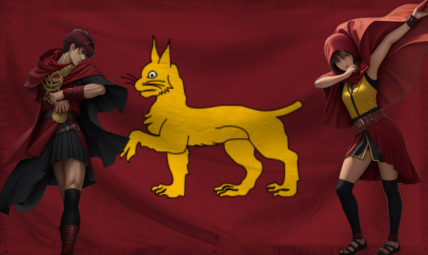

![]() by Kergstan » Thu Dec 10, 2020 8:50 am
by Kergstan » Thu Dec 10, 2020 8:50 am

![]() by Celestialer » Thu Dec 10, 2020 9:34 am
by Celestialer » Thu Dec 10, 2020 9:34 am
NEWS: Celestialer announces Kill Tech test, which it will soon be able to distribute to HSC members | Brutal pandemic in celestialer has killed more than 30 million
![]() by Aikoland » Sun Dec 13, 2020 7:39 pm
by Aikoland » Sun Dec 13, 2020 7:39 pm

![]() by The South Appalachian Region » Sun Dec 13, 2020 8:00 pm
by The South Appalachian Region » Sun Dec 13, 2020 8:00 pm

![]() by Syndic Australia » Sun Dec 13, 2020 10:01 pm
by Syndic Australia » Sun Dec 13, 2020 10:01 pm
Syndic Australia wrote:Austro-Gaelic is a unique language derived from the Gaelic languages of the Brittanic Isles. It incorporates the cants and colloquialisms of the nation's historic syndicates and other revolutionary groups, and is a de facto co-official language, though relatively few can speak it fluently. It can be thought of like Shakespearean English; used mostly for poetry and literature, hated by high school students.
January 27° - The 2025 Federal Election season has begun! Initial three-party preferred polls put the I.S.P. ahead at 37%, followed by the Country Party at 34%, then Labor at 29%.
![]() by Gandoor » Tue Dec 15, 2020 7:32 pm
by Gandoor » Tue Dec 15, 2020 7:32 pm

![]() by Yerbanistan » Fri Dec 18, 2020 11:49 pm
by Yerbanistan » Fri Dec 18, 2020 11:49 pm

![]() by Auzkhia » Sat Dec 19, 2020 9:40 am
by Auzkhia » Sat Dec 19, 2020 9:40 am

![]() by Greater Kamilistan » Sat Dec 19, 2020 10:59 am
by Greater Kamilistan » Sat Dec 19, 2020 10:59 am
News Headlines
Surrendered soldiers of rebel NKFA's regional group said NKFA's main command abandoned them as Armavir regional rebels were losing ground fast | 7th Armavir Free Brigade, alongside few rebel groups as they lose ground to government forces.

![]() by The Uterlands » Sat Dec 19, 2020 11:08 am
by The Uterlands » Sat Dec 19, 2020 11:08 am

![]() by Greater Eireann » Sat Dec 19, 2020 11:15 am
by Greater Eireann » Sat Dec 19, 2020 11:15 am
The North Sea People's Republic, colloquially known as Northaria, established in 1421 A.D. (current constitution: 2022).
A multiethnic Northern European nation with strong democratic and anti-feudal traditions, now building socialism.
We use NS stats, with the exception of tax rates and the related stats. The Northarian population is roughly 88.5 million as of last census.
Member of the Atlantic Defence Agreement and the Arctic Council, current president of the Western European Union.
I reject anything and everything political that I posted on here prior to 2019. She/her, please, I am not a guy.

![]() by Republica Federal de Catalunya » Sat Dec 19, 2020 11:20 am
by Republica Federal de Catalunya » Sat Dec 19, 2020 11:20 am

![]() by Quartia and Karafuto » Sat Dec 19, 2020 11:45 am
by Quartia and Karafuto » Sat Dec 19, 2020 11:45 am

![]() by Zitru » Sat Dec 19, 2020 4:07 pm
by Zitru » Sat Dec 19, 2020 4:07 pm

![]() by Diarcesia » Sat Dec 19, 2020 5:54 pm
by Diarcesia » Sat Dec 19, 2020 5:54 pm

![]() by Radiatia » Sun Dec 20, 2020 2:03 am
by Radiatia » Sun Dec 20, 2020 2:03 am


![]() by Ittonia » Sun Dec 20, 2020 7:04 am
by Ittonia » Sun Dec 20, 2020 7:04 am

![]() by The Elyrion » Fri Dec 25, 2020 9:27 pm
by The Elyrion » Fri Dec 25, 2020 9:27 pm

![]() by Mosarabia » Sat Dec 26, 2020 12:48 am
by Mosarabia » Sat Dec 26, 2020 12:48 am

![]() by Joija » Sat Dec 26, 2020 5:39 am
by Joija » Sat Dec 26, 2020 5:39 am
Funderland Helsberg suffers first fatal accident in 14 years / 2.1m Joijans test positive for COVID / Man arrested for looking at more people 'menacingly'

![]() by Mevraq » Sat Dec 26, 2020 8:34 am
by Mevraq » Sat Dec 26, 2020 8:34 am

![]() by Charoskania » Mon Dec 28, 2020 10:19 am
by Charoskania » Mon Dec 28, 2020 10:19 am
Latest News: Charoskania withdraws from the IHC and founds the ACO|Government announces threat of nuclear war|Royal Family hurried to National Vault

![]() by Brilinako » Mon Dec 28, 2020 4:23 pm
by Brilinako » Mon Dec 28, 2020 4:23 pm
A Nyunsu: Calls for impeachment of President Shuttleworth increase after statement calling for "preventing a generation of tomboys and tomgirls" - Krinskin man arrested at airport after discovery of bag filled with cocaine labeled "bag filled with cocaine" - NU merges with ruling WSE party
Advertisement
Return to Factbooks and National Information
Users browsing this forum: British Georgia, Snowish Republic
Advertisement